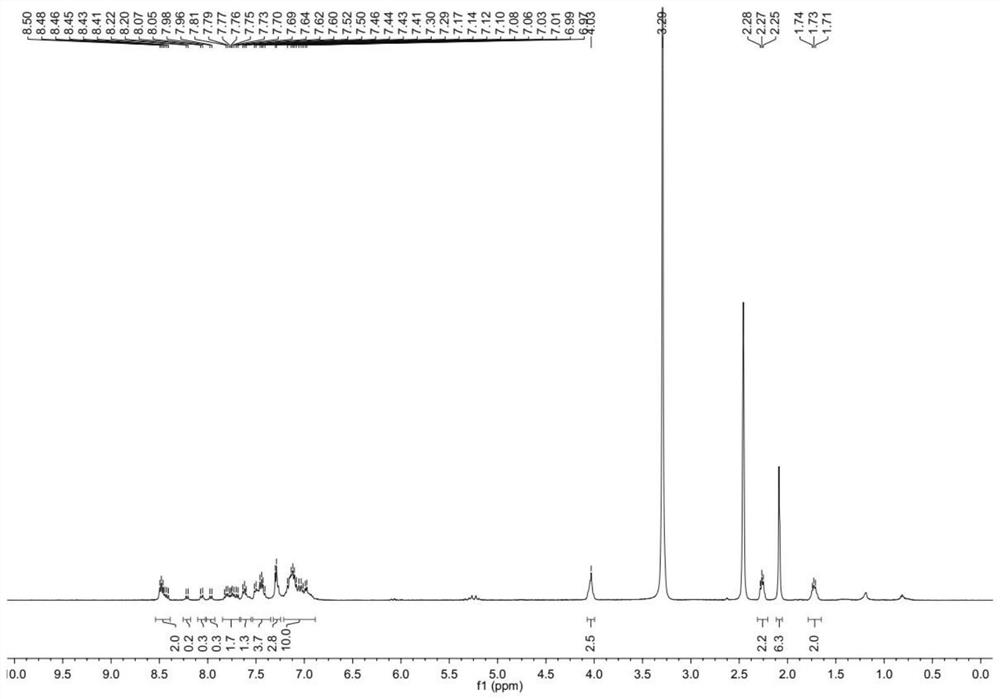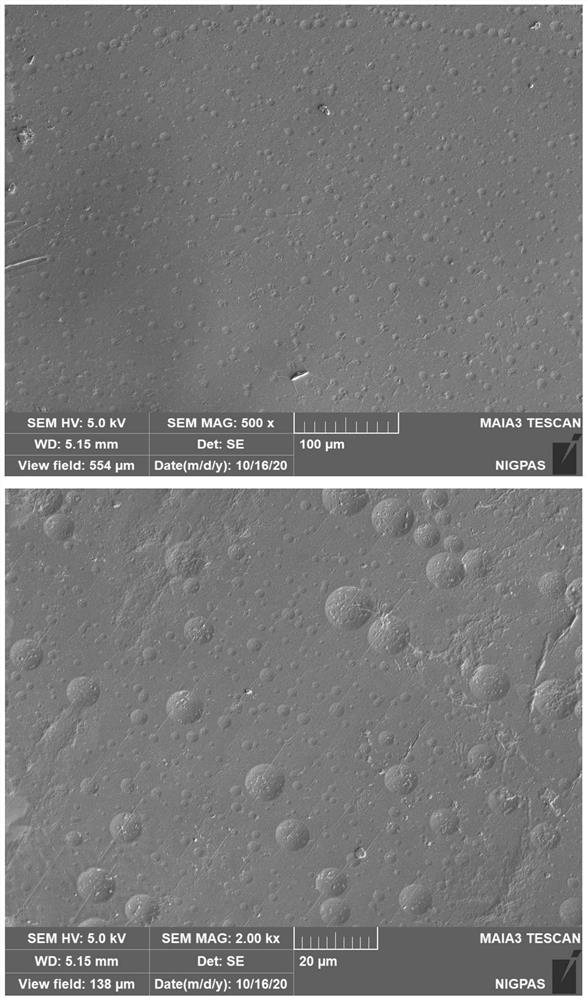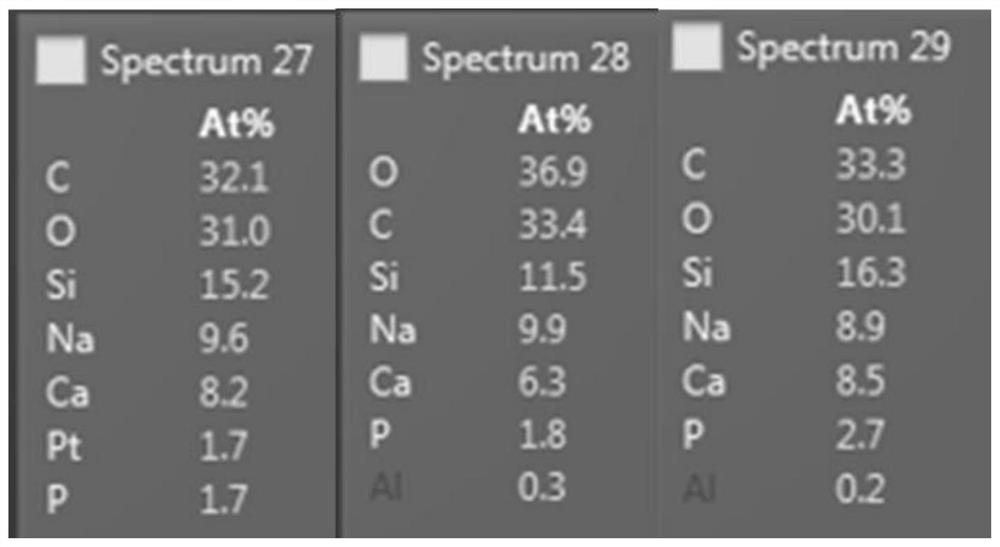Guided tissue regeneration membrane containing TPE-NIM fluorescent probe and preparation method thereof
A technology that guides tissue regeneration and fluorescent probes, applied in the field of oral biomedical materials, can solve problems such as fluorescence quenching, photobleaching, and limit clinical applications, and achieve low cytotoxicity, high photostability, and no drug resistance Effect
- Summary
- Abstract
- Description
- Claims
- Application Information
AI Technical Summary
Problems solved by technology
Method used
Image
Examples
Embodiment 1
[0043] A preparation method of TPE-NIM fluorescent probe, comprising the following steps:
[0044] 1) Synthesis of TPE-Br: Dissolve 2.5g of 4-bromo-phenylbenzophenone and 1.8g of benzophenone in tetrahydrofuran, add 1.6g of zinc powder, stir and react, then add 20ml of titanium tetrachloride solution, 25 React at ℃ for 12 hours, slowly pour the mixture into ice water, stir to quench, add 50ml ethyl acetate, extract twice, filter, concentrate; use a 1:5 mixture of ethyl acetate and petroleum ether as the eluent , the crude product was purified by column chromatography and dried in vacuo to obtain TPE-Br as a light orange solid;
[0045] 2) TPE-B(OH) 2 Synthesis: Dissolve 4.0g TPE-Br in dry anhydrous tetrahydrofuran, slowly add 8mL of 1.0mol / L n-butyllithium solution dropwise, stir and react for about half an hour, add dropwise 5.0mL trimethyl borate, and react for 3 hours After that, the temperature was raised slowly, and the mixture was slowly poured into sodium bicarbonate ...
Embodiment 2
[0054] The preparation method of 45S5 bioactive glass powder, comprises the following steps:
[0055] Heat 2g of 45S5 bioactive glass until melting, immerse 1g of mesoporous silica nanoparticles with a diameter of 80-150μm and a pore size of 3μm-4μm into the molten bioactive glass, so that the molten bioactive glass covers the two Oxide the surface of silicon nanoparticles to obtain nanoparticle 45S5 bioactive glass powder with a diameter of 80-120 μm;
[0056]The resulting 45S5 bioactive glass powder includes 45% SiO 2 , 24.5% Na 2 O, 24.5% CaO and 6% P 2 o 5 .
[0057] Bioactive glass (45S5 BGs) powder of the present invention has the following advantages:
[0058] (1) The particle size is small and the specific surface area is large. The BGs used in the present invention is 45S5BGs powder made by melting method, white and tasteless, and the particle size is 80-120 μm. When it meets water, it forms an alkaline environment rapidly. The pH value is greater than 8, which ...
Embodiment 3
[0062] A preparation method for guiding tissue regeneration film, comprising the following steps:
[0063] Dissolve 76mg of PLGA (LA to GA mass ratio is 75:25, relative molecular weight M=7000-17000) powdery solid into 1ml of tetrahydrofuran by ultrasonication, then add 20mg of Example 2 to obtain 45S5BGs and 4mg of Example 1 respectively TPE-NIM, ultrasonic dispersion, evaporate about 0.5ml of tetrahydrofuran under nitrogen flow, take the remaining suspension and pour the bottom area of 10cm 2 The 45S5 bioactive glass-TPE-NIM fluorescent probe-poly(lactic-co-glycolic acid) guided tissue regeneration membrane can be obtained after standing and ventilating at room temperature for 24 hours in a polytetrafluoroethylene mold, and stored in a dry place at room temperature and protected from light.
[0064] Using a field emission scanning electron microscope and an EDS energy spectrometer to study and analyze the surface morphology and elemental composition of the guided tissue re...
PUM
| Property | Measurement | Unit |
|---|---|---|
| diameter | aaaaa | aaaaa |
| pore size | aaaaa | aaaaa |
Abstract
Description
Claims
Application Information
 Login to View More
Login to View More - R&D
- Intellectual Property
- Life Sciences
- Materials
- Tech Scout
- Unparalleled Data Quality
- Higher Quality Content
- 60% Fewer Hallucinations
Browse by: Latest US Patents, China's latest patents, Technical Efficacy Thesaurus, Application Domain, Technology Topic, Popular Technical Reports.
© 2025 PatSnap. All rights reserved.Legal|Privacy policy|Modern Slavery Act Transparency Statement|Sitemap|About US| Contact US: help@patsnap.com



